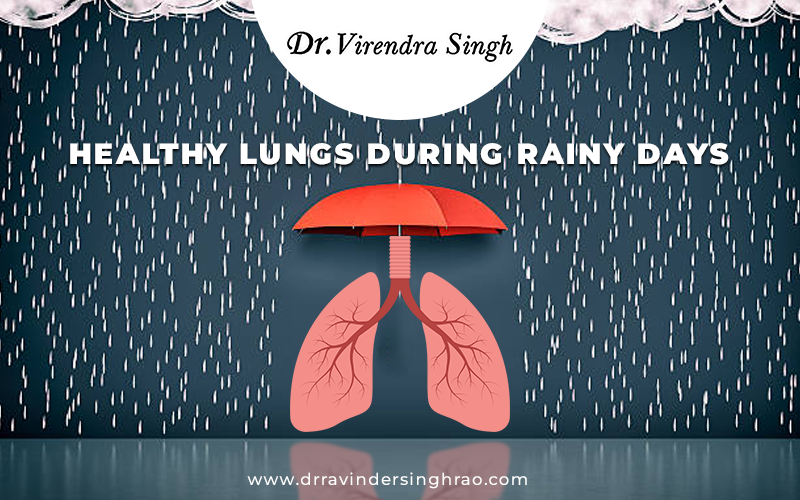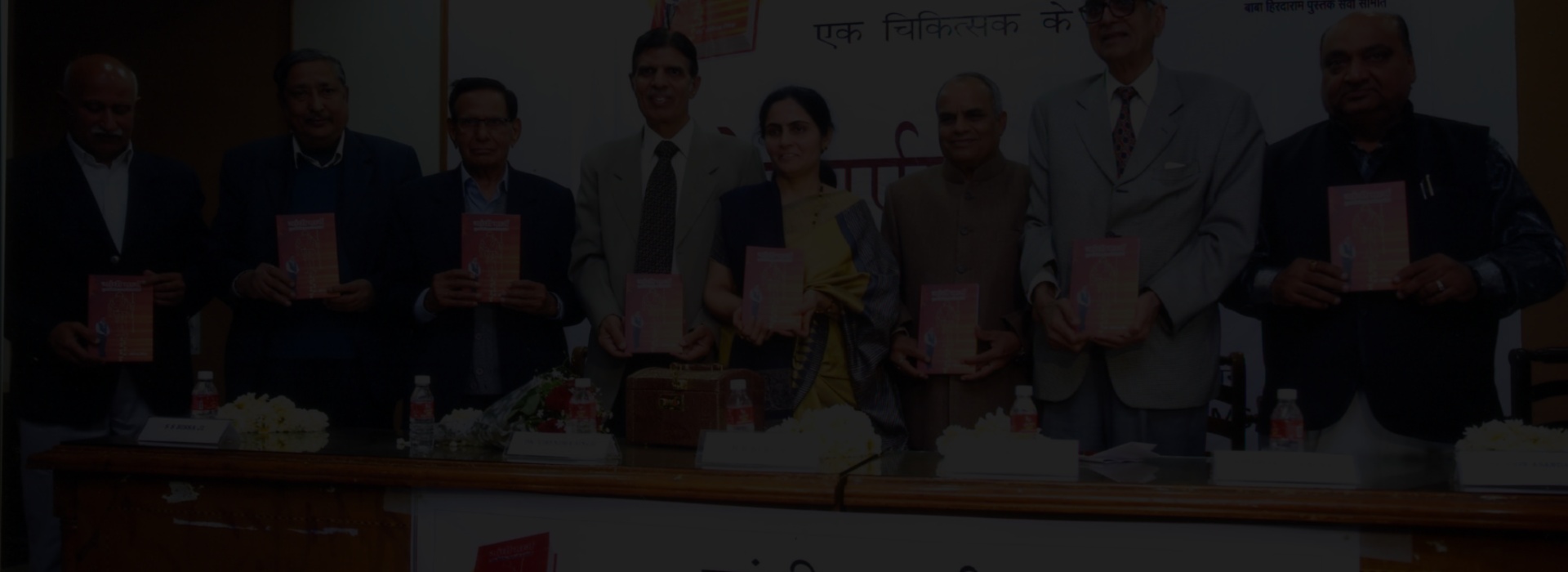
The monsoon season may bring relief from the scorching heat but also poses challenges for individuals with respiratory difficulties. Breathing problems can have a serious negative influence on a person’s quality of life, making even routine chores difficult. The season increases the risk of respiratory infections, so it’s important to know what frequent respiratory ailments are at this time of year, how they manifest, and how to stay healthy. Having the right information, taking the right medication, taking the required precautions, and depending on innovative respiratory care devices can help you regain confidence and live a worry-free life even during the rainy season.
Dr. Virendra Singh guide on “Healthy Lungs During Rainy Days” offers a comprehensive approach to maintaining respiratory health throughout the monsoon season. He emphasizes how crucial it is to stay indoors during severe rainfall to protect yourself from allergens and toxins that flourish in moist environments. Dr. Virendra Singh advises keeping living spaces well-ventilated and free from dampness to prevent mold growth, which can exacerbate respiratory issues. He additionally highlights how important it is to have a well-balanced diet high in antioxidants and vitamins to strengthen the immune system. Regular exercises, preferably indoors, are recommended to keep the lungs strong and healthy.
A study carried out by the Indian Council of Medical Research indicates that during the monsoon season, several individuals in India who suffer from respiratory diseases rises by 20%. The study also found that respiratory issues, which are 25% more common during the monsoon season, put them in unpleasant difficulties.
- Asthma Attack: During the monsoon season, Asthma Attacks can increase by up to 50%. An increase in humidity, the presence of allergens, and a decline in air quality are some of the contributing causes.
- Bronchitis: During the monsoon season, another respiratory ailment that can spread rapidly is Bronchitis. Symptoms of bronchitis include shortness of breath, coughing, and chest tightness.
- Pneumonia: This lung infection can be serious, especially in young children and older adults. The monsoon season brings with it an increased risk of pneumonia because of the wet weather and the prevalence of bacteria and viruses.
- Allergic Rhinitis: Allergic Rhinitis, also known as hay fever, is a common condition that causes symptoms such as runny nose, sneezing, and itchy eyes. Due to an increase in pollen and mold spores in the air, the monsoon season can cause allergic Rhinitis.
Respiratory Diseases During Monsoon Season
Monsoon season increases the prevalence of several respiratory illnesses. We can take preventive action if we are aware of these illnesses and their possible causes. Common respiratory infections during the monsoon season include:
- Common Cold: Rain and humidity can increase the activity of viruses, which can cause the common cold. The symptoms generally include a sore throat, runny or stuffy nose, cough, and mild fatigue.
- Influenza: The influenza virus may spread in areas with precipitation. Symptoms include body aches, fever, sore throat, cough, and fatigue.
- Asthma: The symptoms of asthma are made worse by indoor allergens, increased humidity, and the formation of mold. Common signs are coughing, wheezing, chest tightness, and shortness of breath.
- Pneumonia: Pneumonia is more common in those with compromised immune systems, bacterial, and viral illnesses. Symptoms include chills, high fever, chest pain, productive cough, and difficulty breathing.
Prevention and Treatment
A preventive approach is necessary to prevent respiratory infections during the monsoon season. Here are some preventive measures to consider:
- Maintain Hygiene: Hand sanitizers or frequent hand washing with soap and water are recommended. Refrain from using dirty hands to touch your face.
- Stay Hydrated: To keep your respiratory system hydrated, drink plenty of fluids, it assists flush out toxins.
- Keep Indoor Environment Clean: Maintain a regular cleaning and disinfecting schedule to stop the formation of allergies, mold, and bacteria in your living areas. Ensure proper ventilation and sunlight exposure.
- Avoid Crowded Places: Minimize your time spent in crowded places where the spread of respiratory infections is more likely.
- Boost Immunity: Eat a balanced diet of vegetables, fruits, and immune-boosting foods. Stay physically active and get sufficient rest.
Common Treatment Options For Respiratory Infections Include
- Medications: Depending on the kind and severity of the infection, doctors may recommend antibiotics or antivirals.
- Nebulizers: Nebulizers, like those made by the company, are efficient medical tools that provide medicine straight to the lungs, relieving respiratory conditions quickly. The convert liquid medication into an automized mist that reaches your lungs easily.
The Challenges of Breathing Difficulties
Breathing issues can lead to a variety of issues that affect one’s physical and mental health. Those who suffer from respiratory conditions during the monsoon season may encounter the following problems:
- Reduced Energy and Stamina: People who struggle with their breathing may experience exhaustion and low energy levels, which can lower their quality of life.
- Restricted Physical Mobility: People with respiratory problems may find it difficult to do simple activities like walking short distances or climbing stairs, which might restrict their range of motion.
- Anxiety and Stress: Constantly struggling to breathe can cause anxiety and stress, affecting mental health and overall emotional well-being.
- Increased Vulnerability to Infections: People who suffer from respiratory disorders are especially vulnerable to respiratory infections that are common during the monsoon season as they have weakened immune systems.
- Social Limitations: People with breathing problems may avoid social events and outdoor activities, which makes them feel alone and alienated from other people.
FAQs
What are the common respiratory issues during the monsoon season?
Common respiratory issues include allergies, Bronchitis, Asthma exacerbation, and respiratory infections due to increased humidity and mold growth.
How can I prevent mold growth in my home during the rainy season?
To prevent mold growth, ensure proper ventilation, use Dehumidifiers, regularly clean damp areas, and fix any leaks in the home.
Is it safe to exercise outdoors during the rainy season?
It’s best to avoid outdoor exercise during heavy rain to prevent exposure to allergens and pollutants. Instead, choose indoor exercises to keep your lungs healthy.
What dietary changes can assist support lung health during monsoon?
Incorporate foods rich in Antioxidants, such as vegetables, and fruits, and stay hydrated. Foods like turmeric and ginger can also help reduce inflammation.
Should I avoid cold drinks during the rainy season?
Yes, it’s advisable to limit cold or refrigerated drinks, as they may irritate the respiratory tract. Instead, go for warm liquids like soups or herbal teas.
